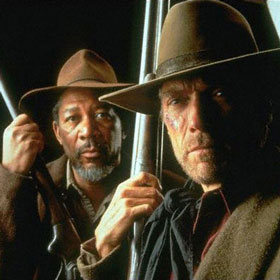Unforgiven: 20th Anniversary Edition Blu-ray

5/5
Nominated for nine Academy Awards and winning four, including best picture, this was a revisionist western brought to us by a man who knows just a thing or two about them. Dedicated to his former mentors Sergio Leone and Don Siegel, genre icon Clint Eastwood offers many allusions to classic westerns, including some of his own, before taking us on a journey that is at its heart a calculated and melancholic destruction of myth in the Old West.
The Great Man stars in front of the camera, as well as behind, playing William Munny, a washed-up, dried-out old gunslinger-turned-reformed-father-and-farmer after his wife got him off the bottle before she passed from the pox. Times are hard on the farm and with two kids and a pen of sick and dying hogs, he decides to take one last job – not for honor, or because it’s what “a man’s gotta do, but for money. Teaming up with his old partner, Ned (Morgan Freeman), and the naive but feisty Schofield Kid (Woolvett), the three ride off in search of a bounty offered by whores on two cowboys who cut one of them up during a trick gone bad. Waiting for them in the town of Big Whiskey is the Sheriff, Little Bill (Gene Hackman), a man with a dislike of bad seeds and anyone who undermines the town’s zero-tolerance policy.
This cornerstone of the post-modern, western revival movement is inimitably gritty and there are several themes at work here: The nature of man as relates to violence, violence as a measure of masculinity, alcoholism and self-destruction. Munny is a man whose life was ravaged and destroyed by the drink. Unable to even recollect his downright contemptible past through the haze of whiskey, to say nothing of making peace with it, he must now relive that past once again as a sober man. These strands play a slight second, however, to a no-nonsense, systematic deconstruction of old west folklore and myth. Unforgiven is a self-referential film.
Factually speaking, what really destroyed the concept of the myth was, ironically enough, the invention of the camera, and with it the ability for things to be documented for what they were with no tacked-on embellishment. To that end, we witness Little Bill's vicious beat down of famed cowboy, English Bob, accompanied by his biographer complete with printed tales of how Bob killed whomever in such-a-place. Hackman's Little Bill is not a cowboy of legend, but stone cold reality and he brutalizes Bob physically before taking his legend to task in a “way back when” speech outlining how things really were. These are old men past their time, and too tired and too embittered play the game anymore. As Munny succinctly puts it when asked how he killed all those people, women and children included, he doesn't point to skill or fearlessness. “I got lucky,” he says. “I guess I was just always lucky when it came to killing folks.”
Blu-ray Special Features:
Much of the special features are listed from Warner Bros’ existing blu-ray release. These include a feature length commentary track by Eastwood biographer Richard Schickel, All on Accounta Pullin’ a Trigger featurette, and Eastwood a Star featurette. Also included are Eastwood & Co: Making of Unforgiven, Eastwood on Eastwood – a career retrospective, and the Maverick TV series episode “Duel at Sundown (1959). What is new and unique to this release is the hardback, gloss color booklet, comprising 54-pages of commemorative images, production notes, trivia and behind-the-scenes tidbits for the fan.
RELATED ARTICLES
Get the most-revealing celebrity conversations with the uInterview podcast!







Leave a comment